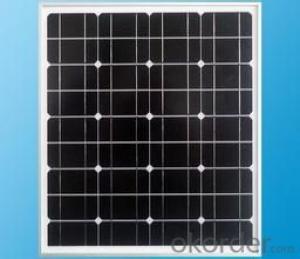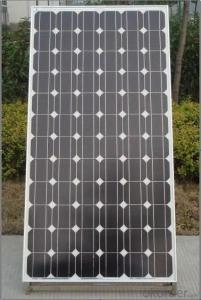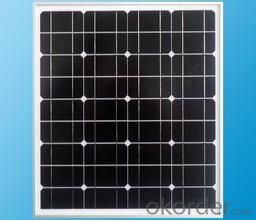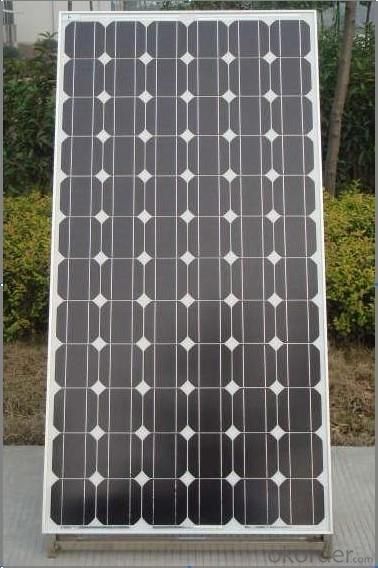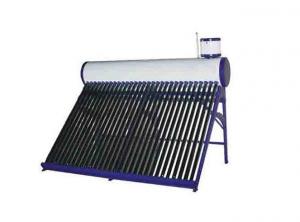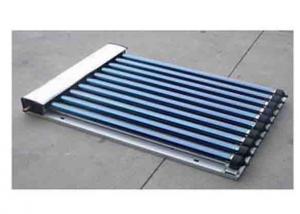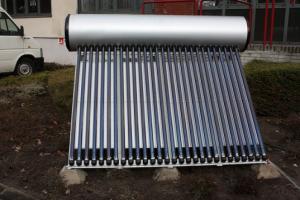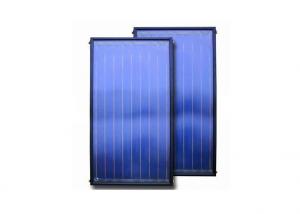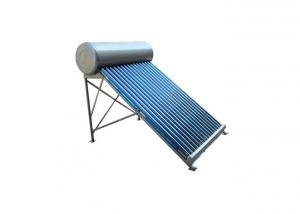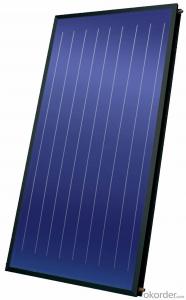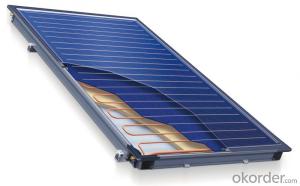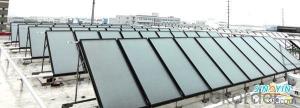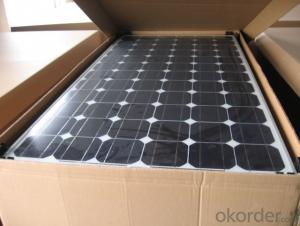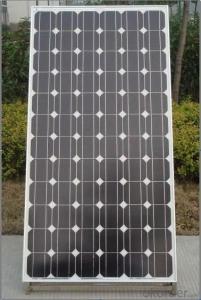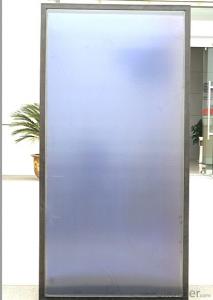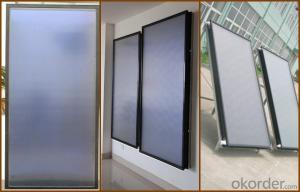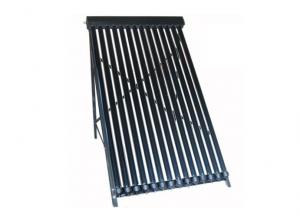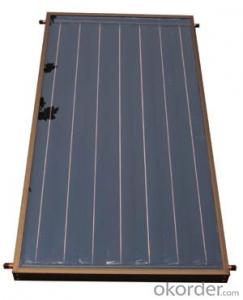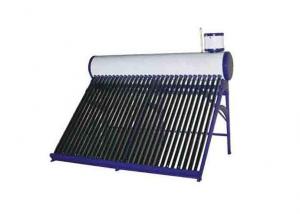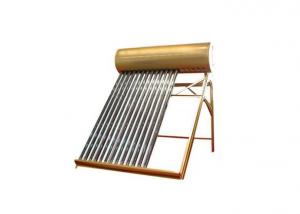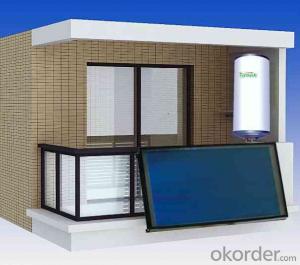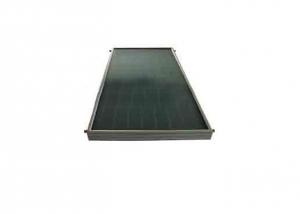Glazed Flat Plate Solar Collectors - Photovoltaic Solar Monocrystalline Series Panels
- Loading Port:
- Tianjin
- Payment Terms:
- TT OR LC
- Min Order Qty:
- 1 pallet
- Supply Capability:
- 100000000 pallet/month
OKorder Service Pledge
OKorder Financial Service
You Might Also Like
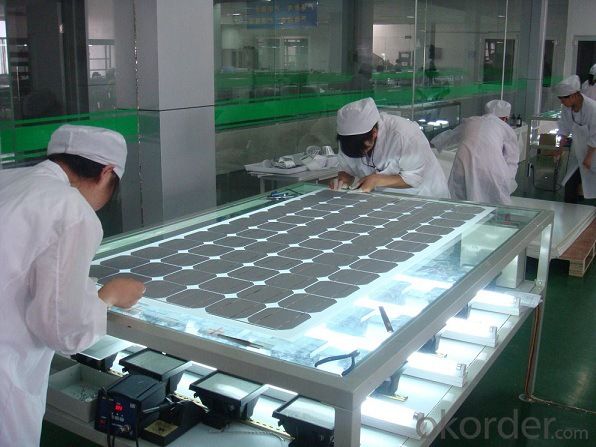
Product Description:
Solar Monocrystalline Series Panels
Introduction of Solar Monocrystalline Series Panels
CNBM Solar photovoltaic (PV) Panel is designed for large electrical power requirements. It is the optimal choice for both on-grid and off-grid power systems. CNBM Solar panel offers high performance of power per square foot of solar array. Monocrystalline silicon(c-Si): often made using the Czochralski process. Single-crystal wafer cells tend to be expensive, and because they are cut from cylindrical ingots, do not completely cover a square solar cell module without a substantial waste of refined silicon. Hence most c-Si panels have uncovered gaps at the four corners of the cells.
Characteristics of Solar Monocrystalline Series Panels
I Solar Cell : High efficiency crystalline solar cell. Even if under the weak light, the solar module can produce maximum power output.
II Tempered glass (toughened glass): Anti-reflecting coating and high transmission rate glass increase the power output and mechanical strength of solar module.
III EVA and TPT: Using high quality EVA and TPT to prevent destroying and water.
IV AI frame: Without screw, corner connection. 6 holes on the frame can be installed easily.
V Junction box: Multi function junction box with water proof.
VI Long lifetime: ≥25 years; Less power decrease
VII Good performance of preventing from atrocious weather such as wind and hails.
VIII Resisting moisture and etching effectively, not effected by geology.
Standard Test Conditions of Solar Monocrystalline Series Panels
The opto-electrical specifications shown below are stabilized values being measured at Standard Test Conditions, Irradiance: 1000W/m2, Spectrum: AM1.5 at 25°C, The info below is subject to manufacturing tolerances. Where appropriate minutes of measurement are available and are used for the dimensioning of the installation.
Advantages of Solar Monocrystalline Series Panels
• CNBM Solar performance guarantees for 25 years
• 12 years guarantee for workmanship
• Timeliness of delivery
CNBM International Corporation's products including Monocrystalline Solar Panel, Polycrystalline Solar Panel have received and enjoyed famous reputation in many countries and regions in the world .As a solar panel supplier in China, we strive to provide our customers with excellent service, superior products and unmatched value.
Characteristics of Solar Monocrystalline Series Panels
Max Power Voltage Vmp (V) | 18.4V | 17.6V |
Max Power Current Imp (A) | 6.52A | 7.39A |
Open Circuit Voltage Voc (V) | 23.0V | 22.2V |
Short Circuit Current Isc (A) | 6.97A | 7.90A |
Max Power Pm (W) | 120W | 130W |
Temperature Coefficient of Cells
NOCT | 47℃±2℃ |
Temperature Coefficients of Isc (%/℃) | 0.064 |
Temperature Coefficients of Voc (%/℃) | -0.33 |
Temperature Coefficients of Pmp (%/℃) | -0.45 |
Mechanical Data Solar Monocrystalline Series
Power | 120W/130W |
Dimension | 1190/1470×670×30mm |
Weight | 9.5kg/11.7kg |
Tolerance | ±3% |
The dimension of the modules can be changed according to the demand of clients
Limits
Operating Temperature | –40 °C to +85°C |
Storage Temperature | –40 °C to +85°C |
Max System Voltage | 700V |
Guarantee Solar Monocrystalline Series Panels
Products Guarantee | 10 yrs free from defects in materials and workmanship |
Performance Guarantee | No less than 90% within 10yrs and no less than 80% within 25yrs |
Certificates | IEC, ISO, TUV, CE |
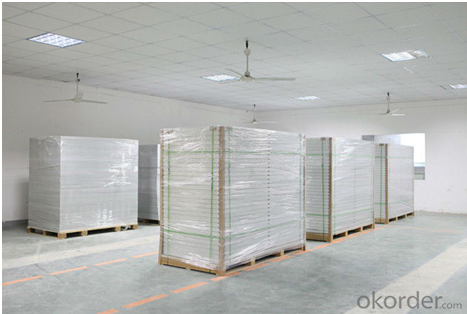
FAQ
We have organized several common questions for our clients,may help you sincerely:
1. What’s price per watt?
A: It’s depends on the quantity, delivery date and payment terms of the order. We can talk further about the detail price issue. Our products is high quality with lower price level.
2. Can you tell me the parameter of your solar panels?
We have different series of cells with different power output, both from c-si to a-si. Please take our specification sheet for your reference.
3. How do you pack your products?
We have rich experience on how to pack the panels to make sure the safety on shipment when it arrives at the destination.
4. Can you do OEM for us?
Yes, we can.
5. How long can we receive the product after purchase?
In the purchase of product within three working days, We will arrange the factory delivery as soon as possible. The perfect time of receiving is related to the state and position of customers. Commonly 7 to 10 working days can be served.
- Q: Can solar collectors be used in solar thermal drying?
- Indeed, solar thermal drying can utilize solar collectors. These devices are designed to capture and convert sunlight into usable thermal energy. In the context of solar thermal drying, solar collectors can be employed to warm up air or a heat transfer fluid. This heated air or fluid is then utilized to dry agricultural products, food, or other materials. Solar thermal drying proves to be an efficient and sustainable approach to drying, as it takes advantage of the abundant and renewable energy provided by the sun. Solar collectors can be integrated into a drying system, either in the form of flat plate collectors or evacuated tube collectors, depending on specific requirements and conditions. When sunlight hits the solar collectors, it absorbs and transfers energy to the air or fluid passing through them. This heated air or fluid is then circulated through the drying chamber, where it comes into contact with the material being dried. The heat from the air or fluid aids in removing moisture from the material, resulting in the drying process. Solar thermal drying offers numerous advantages compared to conventional drying methods. Firstly, it eliminates the need for fossil fuels or electricity, thereby reducing both energy costs and carbon emissions. Secondly, it ensures a more controlled and uniform drying process, leading to improved quality and preservation of dried products. Furthermore, solar thermal drying systems can be easily integrated with existing drying infrastructure, making it a feasible option for various industries and applications. To conclude, solar collectors can indeed be utilized in solar thermal drying. They play a vital role in harnessing solar energy and delivering the necessary heat for the drying process. By utilizing solar collectors, solar thermal drying offers a sustainable and efficient alternative to conventional drying methods.
- Q: What is the impact of temperature variations on the performance of solar collectors?
- Temperature variations can have a significant impact on the performance of solar collectors. Higher temperatures can increase the efficiency of solar collectors, as they enhance the conversion of sunlight into heat or electricity. However, excessive heat can also lead to a decrease in performance, as it can cause overheating and reduce the efficiency of the system. On the other hand, colder temperatures can decrease the overall performance of solar collectors, as it reduces the amount of available sunlight and can affect the fluid circulation within the system. Therefore, maintaining optimal temperature conditions is crucial for maximizing the performance and efficiency of solar collectors.
- Q: How do solar collectors perform in areas with heavy snowfall?
- Solar collectors do not perform well in areas with heavy snowfall as the snow can cover the panels, reducing their ability to absorb sunlight and generate electricity. Additionally, the weight of the snow can potentially damage the collectors.
- Q: Can solar collectors be used for heating art galleries?
- Yes, solar collectors can be used for heating art galleries. Solar collectors, such as solar thermal panels, can harness the sun's energy to heat water or air. This heat can then be used to warm the interior of art galleries, providing a sustainable and cost-effective solution for maintaining optimum temperature and climate conditions for preserving artwork.
- Q: Can solar collectors be used for heating livestock facilities?
- Yes, solar collectors can be used for heating livestock facilities. Solar heating systems can provide a sustainable and cost-effective solution for heating these facilities. Solar collectors, such as solar water heaters or solar air heaters, can be installed to harness the sun's energy and convert it into heat. This heat can then be used to warm the air or water in the livestock facilities, creating a comfortable and healthy environment for the animals. Solar water heaters can be used to heat water for various purposes in livestock facilities, such as providing hot water for cleaning, sterilizing equipment, or even for the animals to drink. Solar air heaters, on the other hand, can be used to warm the air inside the facilities, ensuring that the animals are kept at a suitable temperature during colder months. Using solar collectors for heating livestock facilities brings several advantages. Firstly, it reduces reliance on fossil fuels and contributes to a more sustainable and environmentally friendly operation. Secondly, it can significantly reduce heating costs, as solar energy is abundant and free. Additionally, solar heating systems require minimal maintenance and have a long lifespan, making them a reliable and durable solution. However, it is important to consider the specific requirements and size of the livestock facility when planning to install solar collectors. Factors such as the number of animals, the size of the facility, and the local climate should be taken into account to ensure that the solar heating system is appropriately sized and designed to meet the heating demands. Consulting with solar energy experts or professionals in the field can help in designing an efficient and effective solar heating system for livestock facilities.
- Q: With the tonnage of solar collectors and air to hot water which power consumption
- resulting in no hot water in the rain and snow weather; and air to hot water works relative It is not affected by the sunshine, theoretically can be used throughout the year.
- Q: Can solar collectors be used for heating churches and religious buildings?
- Yes, solar collectors can be used for heating churches and religious buildings. Solar thermal systems can provide heat for space heating and hot water needs. By harnessing solar energy, these collectors can help reduce energy costs and carbon emissions while providing warmth to these places of worship.
- Q: Are solar collectors suitable for historic buildings?
- Yes, solar collectors can be suitable for historic buildings. With proper planning and design, solar collectors can be integrated into the architecture of historic buildings in a way that preserves their aesthetic value. Additionally, solar collectors can provide sustainable energy solutions without compromising the historical integrity of the structure.
- Q: Are solar collectors safe to use?
- Yes, solar collectors are safe to use. They do not emit harmful gases or pollutants, and the energy conversion process is non-combustible, reducing the risk of fire hazards. Additionally, modern solar collectors have safety features and undergo rigorous testing to ensure their reliability and user safety.
- Q: Are solar collectors suitable for heating sports facilities?
- Yes, solar collectors are suitable for heating sports facilities. Solar collectors can efficiently convert sunlight into heat energy, which can be used to heat water or air for indoor spaces. This makes them a sustainable and cost-effective solution for heating large areas such as sports facilities, providing a comfortable environment for athletes and spectators alike. Additionally, solar collectors can be easily integrated into the existing infrastructure of sports facilities, making them a practical and environmentally friendly choice.
Send your message to us
Glazed Flat Plate Solar Collectors - Photovoltaic Solar Monocrystalline Series Panels
- Loading Port:
- Tianjin
- Payment Terms:
- TT OR LC
- Min Order Qty:
- 1 pallet
- Supply Capability:
- 100000000 pallet/month
OKorder Service Pledge
OKorder Financial Service
Similar products
Hot products
Hot Searches
Related keywords
